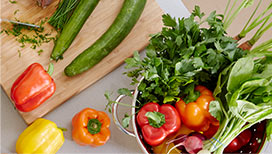Eating Well on a CKD Diet

When you’re living with chronic kidney disease (CKD), what you eat and drink—and how much—is important and you'll want to start eating a kidney-friendly diet. Someone in the early stages of kidney disease may have different dietary needs than someone in the later stages. Talking to your doctor or renal dietitian will help you learn exactly what to eat and drink and why. Eating well and following a chronic kidney disease diet is key to keeping your kidneys working as long as possible.
Learn to read and understand nutrition labels
It’s important for people living with CKD to understand how to read nutrition labels. In addition to keeping an eye on certain nutrients, pay close attention to serving size. Be aware that the serving size listed may not match how much you actually expect to eat.
When reading nutrition labels, the % daily value (DV) tells you how much a serving of food contributes to a daily diet (based on a diet of 2,000 calories). Try sticking to the following % daily values for each serving:
- Dietary fiber—more than 10% DV
- Saturated fat—less than 10% DV
- Trans fat—none
- Sodium—less than 10% DV
- Added sugars—less than 10% DV

What is a CKD diet and how is it different?
Although a kidney-friendly diet follows many of the same basic ideas of a regular healthy diet, people living with CKD may also need to watch or limit certain foods. When your kidneys aren’t functioning at 100 percent, waste and fluid can build up in the body, causing health problems. Eating well can help your kidneys continue to function and keep you feeling your best.
People with kidney disease may need to limit their intake of:
In order to feel your healthiest, your individual needs may change if kidney disease progresses. Your doctor or dietitian may recommend dietary changes based on the results of your blood tests. If you already follow a certain diet for diabetes, high blood pressure, or other heart conditions, continue following those dietary recommendations as well.

Choose healthier proteins
When you’re choosing proteins, it’s a good idea to avoid processed or fast foods. Instead, choose plant-based options or fresh, lean animal proteins. Watch your portion sizes and how often you eat protein-rich foods, especially if your doctor has discussed reducing your protein intake to protect your kidneys. If you’re unsure of how much protein you should eat, ask your doctor or renal dietitian for help.
Some healthy protein choices to consider include:
• Soy, tofu
• Beans
• Seeds
• Lentils
• Whole wheat
• Nuts
• Peanut butter
• Brown rice
• Peas
• Green beans
• Chickpeas
• Chicken
• Turkey
• Fish
• Shellfish
• Beef
• Pork
• Eggs
• Dairy & fresh cheese
Knowing how much protein is too much—or too little
If your kidney function is less than 25% or stage 4 of CKD, you may be instructed to cut back on red meat, poultry, fish, and dairy since they contain high levels of protein. However, it’s important to understand that protein is still essential for all bodily functions, so follow your doctor or dietitian’s exact recommended protein intake.
Limit your sodium
- Choose fresh foods—natural foods like fresh fruits and vegetables are great low-sodium choices because they contain less sodium compared to processed and fast foods.
- Read food labels closely—foods with a % Daily Value of less than 10% for sodium are good options. Watch out for “reduced sodium” or “light in sodium” options, as these can still be high in sodium or potassium.
- Stick to salt-free seasonings—fresh or dried herbs, spices, and salt-free seasonings can still pack tons of flavor without the need for lots of sodium that can be hard on your kidneys.
Balancing potassium for your heart
Portion control helps you manage your potassium levels. A portion is generally one half cup. Remember, eating more than one portion can turn a lower-potassium food into a high-potassium one—simply because of the amount you’re eating.
Keeping phosphorus levels in check
- Increased risk of hip fractures
- Increased risk of cardiovascular disease, which is a disease of the heart and blood vessels
All phosphorus is not created equal. Chemically added phosphorus is absorbed more than naturally occurring phosphorus. Look for ingredients containing "PHOS" in food labels and try to steer clear of them!
Measuring your fluid intake
- Soup
- Ice cream, sherbet, sorbet
- Nutritional drinks and smoothies
- Gelatin (Jell-O®)
- Ice cubes or ice chips
Tip: Foods that melt or are liquid at room temperature are considered fluids.
If your doctor has talked to you about limiting your fluids as part of a kidney disease diet, keeping track of your daily fluid intake is a good idea.
Questions about what to eat? Talk to your doctor
Shopping gets easier with a pocket list of foods to choose for CKD
